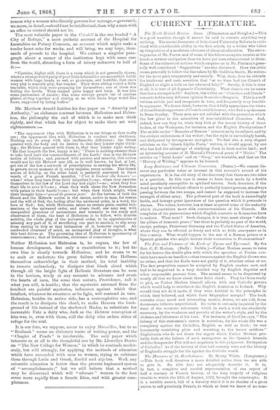The Fate and Fortunes of the Earls of Tyrone and
Tyrconnel. By the Rev. C. P. Meehan. (Duffy: Dublin.)—Father Meehan seems to raise for his heroes the double plea with which the speeches of Fenian con- victs have made us familiar,—that treason against the English Crown was no crime, and that the Earls were not guilty of it, whether crime or no. The first proposition cannot be accepted by English readers now, and had to be negatived in a very decided way by English deputies and other responsible persons then. The second seems to be disproved by nearly all that we know about those Irish chiefs. They had been ready to plot, as Father 3leehan himself allows, with any Catholic powers which would help to overthrow the English dominion in Ireland. Why should they not do it again, if they were faithful to the principles in which they believed, and which their biographer accepts ? The book contains some novel and interesting matter, drawn, we are told, from documents hitherto unpublished. Its value is seriously impaired by the want of the accurate references which in such a work are absolutely necessary, by the weakness and poverty of the writer's style, and by the violence and bitterness of his tone. For instance, of Cecil he says, " The infamy of this statesman's career is notorious, for his whole life was a conspiracy against the Catholics, English as well as Irish ; he was incessantly contriving plots and resorting to the basest artifices." Englishmen who do not share the regret which Father Meehan pro- bably feels at the failure of such enterprises as the Spanish Armada and the Gunpowder Plot will not acquiesce in this judgment. Extirpation of Catholics ! As if the history of that half-century wero not the history of England's struggle for life against the Catholic world.


































 Previous page
Previous page